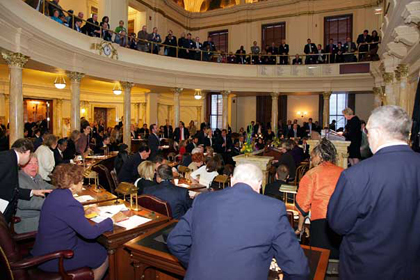
Would Allow In-Person Voting At Designated Polling Locations Up To 15 Days Prior To Election
TRENTON – Legislation sponsored by Senators Nia H. Gill and Jim Whelan to establish early voting in New Jersey was approved today by a Senate committee. The Legislation would permit voters to cast ballots in person at designated polling locations as early as 15 days prior to an election.
“The cornerstone of our democracy is the ability to vote, so making the process accessible, effective and efficient must be our priority,” said Senator Gill (D-Essex/Passaic). “Early voting will expand voter access and ensure that even in an emergency, such as a natural disaster like Hurricane Sandy, or in the case of an unforeseen personal scheduling conflict, residents will still be able to get to the polls and exercise their fundamental right to vote.”
The bill (S-2364) would establish an early voting procedure to allow voters to cast their ballots at designated polling places starting on the 15th day before the primary election and the General Election, and ending on the second calendar day – or the Sunday – before the election. A municipality holding elections on the second Tuesday in May, by an ordinance adopted by its governing body could also conduct early voting for municipal elections. Each county board of elections would be responsible for creating and carrying out a written plan to ensure, to the greatest extent possible, the integrity of the voting process including the security of the ballots.
“Early voting encourages participation and helps to promote a more secure and reliable process for voters, reducing the likelihood of long lines and other problems that may arise when polling places become overwhelmed,” said Senator Whelan (D-Atlantic). “Implementing a uniform procedure for early in-person voting will also ensure that if a storm or a natural disaster is forecast, residents can vote in advance under a process they are familiar with rather than face confusion like many did in the aftermath of Sandy when polling places were moved, and voting was being done by email and fax.”
Early voting would enable a registered voter to vote at a designated polling place by paper ballot. Polling places would be open to voters seven days a week, with uniform voting hours statewide – 10 a.m. to 8 p.m. Monday through Saturday; and 12 p.m. to 6 p.m. on Sunday. Each county board of elections would designate at least one public location in each municipality for early voting, including but not limited to courthouses, libraries, and the offices of the municipal clerk and the county clerks. Whenever possible, each location would be geographically located in the part of the municipality that features the greatest concentration of population, according to the most recent federal census. In towns or cities with more than 30,000 registered voters the county board of elections would designate additional polling sites in proportion to the number of registered voters in the municipality under a process set by the Secretary of State.
“For many of our residents who are juggling work, family and other obligations, finding time to vote within the traditional voting window can be difficult,” said Senator Whelan. “Early voting is about expanding opportunities for our residents to take part in the democratic process and to have their voices heard.”
In his inaugural address, President Barack Obama expressed the need for voting reform, referencing the long lines that plagued the process on Election Day during the general election in 2012. Currently, two-thirds of the states–32, plus the District of Columbia–offer some sort of early voting, according to the National Conference of State Legislatures.
“It is well past time that New Jersey begins to work towards expanding voter access in this state to reflect the needs of our residents,” said Senator Gill. “Simply put, if we can go all around the world to promote democracy, the right to vote, and the integrity of the vote, we must be willing to invest in the infrastructure here at home that will make the voting process effective, efficient and secure.”
The Senate State Government, Wagering, Tourism & Historic Preservation Committee approved the bill by a vote of 3-2. It now heads to the Senate Budget and Appropriations Committee for consideration.


